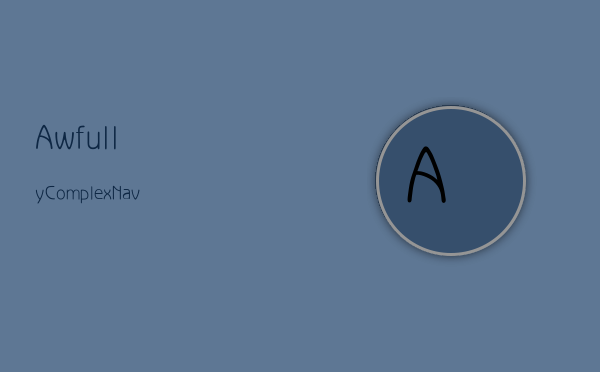Awfully Complex:Navigating the Intricacies of Modern Life
In a world that is awfully complex, navigating the intricacies of modern life can feel like an overwhelming task. The term "awfully" often carries a negative connotation, suggesting something that is excessively bad or unpleasant. However, in this context, it serves as a lens through which we can examine the multifaceted challenges and opportunities that define our contemporary existence. From technological advancements to social dynamics, the awfully complex nature of our world demands a nuanced understanding and a proactive approach to problem-solving.

The Awfully Rapid Pace of Technological Change
One of the most striking aspects of modern life is the awfully rapid pace of technological change. In just a few decades, we have witnessed the advent of the internet, smartphones, artificial intelligence, and countless other innovations that have transformed the way we live, work, and interact. While these advancements have brought about unprecedented convenience and efficiency, they have also introduced new complexities and challenges.
For instance, the rise of social media has revolutionized communication, enabling people to connect across vast distances in real-time. However, it has also given rise to issues such as cyberbullying, misinformation, and the erosion of privacy. The awfully fast evolution of technology means that society often struggles to keep up, leading to a lag in the development of regulatory frameworks and ethical guidelines. As a result, individuals and organizations must navigate a constantly shifting landscape, where the rules of engagement are often unclear or non-existent.
Moreover, the rapid pace of technological change has significant implications for the job market. Automation and artificial intelligence are increasingly replacing human labor in various industries, leading to concerns about job displacement and economic inequality. The awfully complex nature of this issue requires a multifaceted approach, including investment in education and retraining programs, as well as the development of policies that promote equitable access to opportunities.
The Awfully Intricate Web of Social Dynamics
Another aspect of modern life that is awfully complex is the intricate web of social dynamics. In an increasingly interconnected world, individuals are exposed to a diverse array of cultures, beliefs, and perspectives. While this diversity can enrich our lives and foster mutual understanding, it can also lead to misunderstandings, conflicts, and social fragmentation.
The awfully intricate nature of social dynamics is particularly evident in the realm of identity politics. As people become more aware of the various dimensions of their identity—such as race, gender, sexuality, and religion—they are also more likely to advocate for their rights and demand recognition. While this has led to important social progress, it has also created tensions and divisions, as different groups vie for visibility and representation.
Navigating these social complexities requires empathy, open-mindedness, and a willingness to engage in difficult conversations. It also necessitates a commitment to inclusivity and equity, ensuring that all voices are heard and valued. In an awfully complex social landscape, fostering a sense of community and belonging is more important than ever.
The Awfully Challenging Environmental Crisis
Perhaps the most pressing issue of our time is the awfully challenging environmental crisis. Climate change, deforestation, pollution, and the depletion of natural resources are just a few of the environmental challenges that threaten the planet's ecosystems and the well-being of future generations. The awfully complex nature of these issues requires a coordinated global response, as well as individual and collective action.
The environmental crisis is deeply intertwined with other aspects of modern life, such as economic development, technological innovation, and social equity. For example, the transition to a sustainable economy requires significant investment in renewable energy, green infrastructure, and sustainable practices. However, this transition must also address the needs of communities that are disproportionately affected by environmental degradation and economic inequality.
In addition to policy and technological solutions, addressing the environmental crisis requires a shift in mindset and behavior. Individuals must adopt more sustainable lifestyles, reducing their carbon footprint and making conscious choices that prioritize the health of the planet. This awfully complex challenge demands a holistic approach that integrates environmental, social, and economic considerations.
The Awfully Ambiguous Nature of Ethics and Morality
In an awfully complex world, the lines between right and wrong are often blurred, leading to ethical dilemmas and moral ambiguity. Advances in technology, for instance, have raised questions about the ethical implications of artificial intelligence, genetic engineering, and data privacy. Similarly, social and political issues such as immigration, healthcare, and criminal justice are fraught with ethical complexities that defy easy solutions.
Navigating these ethical challenges requires critical thinking, moral reasoning, and a commitment to ethical principles. It also necessitates a willingness to engage in dialogue and debate, recognizing that different perspectives and values may lead to different conclusions. In an awfully ambiguous ethical landscape, it is essential to approach these issues with humility and a recognition of the limitations of our understanding.
Conclusion: Embracing the Awfully Complex
In conclusion, the awfully complex nature of modern life presents both challenges and opportunities. From the rapid pace of technological change to the intricate web of social dynamics, the environmental crisis, and the ambiguous nature of ethics and morality, navigating the complexities of our world requires a multifaceted approach. It demands adaptability, resilience, and a commitment to continuous learning and growth.
Rather than being overwhelmed by the awfully complex, we can embrace it as an opportunity to innovate, collaborate, and create a better future. By fostering a culture of curiosity, empathy, and ethical responsibility, we can navigate the complexities of modern life with confidence and purpose. In doing so, we can transform the awfully complex into the awfully possible, unlocking the potential for positive change and collective progress.
推荐阅读
 微信客服
微信客服 微信公众号
微信公众号




